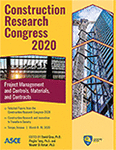Construction Research Congress 2020
Proposed Improvements to the Construction of Electrically Conductive Concrete Pavement System Based on Lessons Learned
Publication: Construction Research Congress 2020: Project Management and Controls, Materials, and Contracts
ABSTRACT
The construction of electrically conductive concrete (ECON) pavement systems include several additional processes which make it different from the construction of regular rigid pavement systems. These can include the use of embedded electrodes, and two-lift concrete construction with different concrete mix designs. This study focuses on the lessons learned from constructing ECON slabs using these methods at the Des Moines International Airport and Iowa Department of Transportation Headquarters, as the first full-scale implementations of a carbon fiber-based ECON pavement system. Based on these efforts, a set of best practices is proposed to help minimize the time required to prepare the setup for placing ECON as the top lift of the pavement. These practices mainly include improvements in scheduling and decision making for the installation time and location of system components including electrodes, conduits, control unit, and sensors, and choosing appropriate both electrical and sensor wires’ length, along with the instrumentation process. Applying these best practices improves the quality of the ECON pavement system, decreases the required labor, simplifies the project management process, and results in significant savings in money and construction time.
Get full access to this article
View all available purchase options and get full access to this chapter.
ACKNOWLEDGEMENTS
The authors would like to thank the Iowa Department of Transportation (DOT) and Iowa Highway Research Board (IHRB) for providing the matching fund for this research project that is sponsored by Federal Aviation Administration (FAA). The authors would also like to thank the FAA Air Transportation Center of Excellence for the Partnership to Enhance General Aviation Safety, Accessibility and Sustainability (PEGASAS). The IHRB technical advisory committee (TAC) members from Iowa DOT and Iowa Counties, particularly Mr. Mike Harvey the Iowa DOT facility manager and Iowa DOT electricians, the FAA technical monitor and Mr. Gary L. Mitchell at the American Concrete Pavement Association are gratefully acknowledged for their guidance, support, and direction throughout the research. The authors would like to express their sincere gratitude to other research team members in ISU Program for Sustainable Pavement Engineering and Research (PROSPER) for their assistance with the lab and field investigations. Although the Iowa DOT and FAA have sponsored this study, they neither endorse nor reject the findings of this research. The presentation of this information is in the interest of invoking comments by the technical community with respect to the results and conclusions of the research.
REFERENCES
Abdualla, H., Ceylan, H., Cetin, K. S., Kim, S., Taylor, P. C., Mina, M., Cetin, Bora Gopalakrishnan, K., and Sadati, S. (2018a). “Construction Techniques for Electrically Conductive Heated Pavement Systems.” Construction and Environmental Engineering Conference Presentations and Proceedings, 551–561.
Abdualla, H., Ceylan, H., Kim, S., Gopalakrishnan, K., Taylor, P. C., and Turkan, Y. (2016). “System requirements for electrically conductive concrete heated pavements.” Transportation Research Record, 2569, 70–79.
Abdualla, H., Ceylan, H., Kim, S., Mina, M., Cetin, K. S., Taylor, P. C., Gopalakrishnan, K., Cetin, B., Yang, S., and Vidyadharan, A. (2018b). “Design and Construction of the World’s First Full-Scale Electrically Conductive Concrete Heated Airport Pavement System at a U.S. Airport.” Transportation Research Record, (November).
Abdualla, H., Ceylan, H., Kim, S., Mina, M., Cetin, K. S., Taylor, P., Gopalakrishnan, K., Cetin, B., Yang, S., Sassani, A., and others. (2018c). Design and Construction of the First Full-Scale Electrically Conductive Concrete Heated Airport Pavement System at a US Airport.
Gopalakrishnan, K., Ceylan, H., Kim, S., Yang, S., and Abdualla, H. (2015). “Self-Heating Electrically Conductive Concrete for Pavement Deicing: A Revisit.” Transportation Research Board 94th Annual Meeting., No. 15-4764.
Hu, J., Siddiqui, M. S., Fowler, D. W., and Whitney, D. (2019). “Potential Technical and Cost Benefits of Two-Lift Concrete Paving.” Airfield and Highway Pavements.
Malakooti, A. (2017). “Investigation of Concrete Electrical Resistivity As a Performance Based Test.” Utah State University.
Malakooti, A., Abdualla, H., Sassani, A., Ceylan, H., and Kim, S. (2019). “Effect of Electrode Geometry and Size on Heating Performance of Electrically Conductive Concrete (19-02535).” Transportation Research Board (TRB) 99th Annual Meeting, Washington, D.C.
Malakooti, A., Maguire, M., and Thomas, R. J. (2018). “Evaluating Electrical Resistivity as a Performance based Test for Utah Bridge Deck Concrete (CAIT-UTC-NC35).” Rutgers University. Center for Advanced Infrastructure and Transportation.
Sadati, S. M. S., Cetin, K., and Ceylan, H. (2017). “Numerical Modeling of Electrically Conductive Pavement Systems.” Congress on Technical Advancement 2017, ASCE, Duluth, MN, 1–10.
Sadati, S. M. S., Cetin, K., Ceylan, H., Sassani, A., and Kim, S. (2018). “Energy and thermal performance evaluation of an automated snow and ice removal system at airports using numerical modeling and field measurements.” Sustainable Cities and Society, Elsevier, 43(August), 238–250.
Sassani, A., Arabzadeh, A., Ceylan, H., Kim, S., Sadati, S. M. S., Gopalakrishnan, K., Taylor, P. C., and Abdualla, H. (2018). “Carbon fiber-based electrically conductive concrete for salt-free deicing of pavements.” Journal of Cleaner Production, Elsevier Ltd, 203, 799–809.
Swarna, S. T., Hossain, K., Reddy, M. A., and Pandey, B. B. (2019). “A mechanistic and economic analysis of two-lift concrete pavements.” Road Materials and Pavement Design, Taylor & Francis, 0(0), 1–19.
Information & Authors
Information
Published In
Construction Research Congress 2020: Project Management and Controls, Materials, and Contracts
Pages: 1049 - 1056
Editors: David Grau, Ph.D., Arizona State University, Pingbo Tang, Ph.D., Arizona State University, and Mounir El Asmar, Ph.D., Arizona State University
ISBN (Online): 978-0-7844-8288-9
Copyright
© 2020 American Society of Civil Engineers.
History
Published online: Nov 9, 2020
Published in print: Nov 9, 2020
Authors
Metrics & Citations
Metrics
Citations
Download citation
If you have the appropriate software installed, you can download article citation data to the citation manager of your choice. Simply select your manager software from the list below and click Download.
